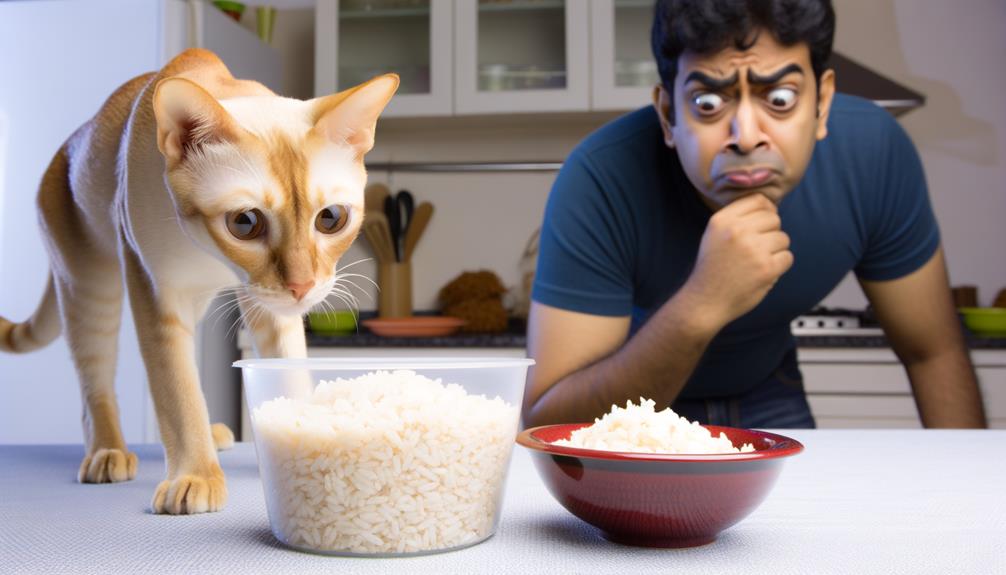You might wonder if sharing a small piece of your Rice Krispy treat with your cat is harmless, but is it really? While it may seem like a fun idea, there are several factors to evaluate about your feline friend's diet and health. Cats are obligate carnivores, and their nutritional needs are quite different from ours. The high sugar and carbohydrate content in Rice Krispy treats could pose risks you haven't thought about. So, what exactly happens when a cat consumes such a treat? Let's explore the potential health implications and why it's best to think twice before offering that sugary snack.
Nutritional Profile of Rice Krispies
When evaluating the nutritional profile of Rice Krispies, it's important to recognize that their composition is far from ideal for cats. As obligate carnivores, cats require a diet high in animal-based protein and low in carbohydrates. Rice Krispies, primarily made from puffed rice and sugar, diverge greatly from these dietary needs.
A typical serving of Rice Krispies contains about 36 grams of carbohydrates and only 3 grams of protein. This skewed nutritional profile is inadequate for cats, who thrive on protein-rich foods. The high carbohydrate content can lead to various health issues, which we'll discuss later, but suffice it to say, it's not what your feline friend needs.
Moreover, the sugar content in Rice Krispies is another red flag. Cats lack the taste receptors for sweetness, meaning they derive no sensory or nutritional benefit from sugar. Instead, sugar contributes empty calories that can lead to obesity and other health complications. When you consider additional ingredients like salt and barley malt extract, it becomes even clearer that these components offer no substantial nutritional benefits to cats and could potentially pose risks in large quantities.
Rice Krispies treats, which often include marshmallows and butter, exacerbate these issues by adding even more sugar and unhealthy calories. Such treats are far removed from what is considered nutritionally sound for cats. Given their obligate carnivore status, cats need treats that complement their dietary requirements, focusing on high protein and minimal carbohydrates.
Potential Health Risks
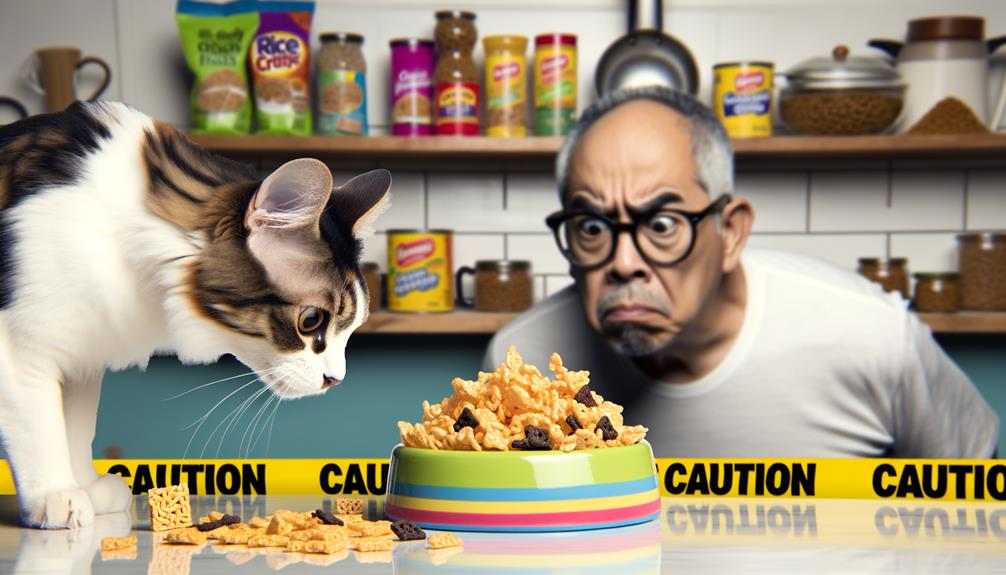
You should be aware that Rice Krispie treats pose significant health risks to your cat. Their high sugar and carbohydrate content can lead to digestive issues like gas and discomfort, while regular consumption may contribute to obesity and diabetes. In addition, these treats lack the essential nutrients that obligate carnivores require, making them a poor dietary choice for your feline friend.
Digestive Issues Potential
Consuming Rice Krispies treats, laden with sugar and carbohydrates, can greatly disrupt a cat's digestive system, particularly if ingested in large quantities. Cats are obligate carnivores that thrive on high protein and low carbohydrate diets. Introducing sugary treats like Rice Krispies can lead to significant digestive issues. Symptoms may include gas, bloating, and diarrhea, as their gastrointestinal systems aren't equipped to handle high sugar intake.
Even a small amount of Rice Krispies treats can precipitate gastrointestinal upset, but the real concern lies in prolonged exposure. Chronic consumption of these sugary treats can exacerbate digestive problems over time. The cumulative effect of high sugar content might create a cycle of ongoing discomfort and digestive distress, potentially leading to more severe health complications.
Monitoring your cat's reaction after consuming Rice Krispies treats is important. If you notice any symptoms of digestive issues, such as persistent diarrhea or bloating, it's advisable to seek veterinary consultation immediately. While occasional treats might not cause immediate harm, their long-term effects can be detrimental. Prioritizing a diet rich in high protein and low in carbohydrates is essential for maintaining your cat's best health and well-being.
Risk of Obesity
Curiously, how does the habitual feeding of Rice Krispies treats impact a cat's weight and overall health? Regular consumption of Rice Krispies treats can greatly contribute to obesity in cats due to their high sugar and carbohydrate content. Cats, being obligate carnivores, require a diet rich in animal protein, not the empty calories found in sugary snacks. This imbalance can lead to poor diet quality and excessive weight gain.
Excessive calories from these treats can result in severe health problems like heart disease and joint issues. Additionally, the high sugar content increases the risk of diabetes and other weight-related health issues. Monitoring your cat's calorie intake and maintaining a balanced diet is vital to prevent these risks.
Here's a breakdown of how Rice Krispies treats can impact your cat:
| Component | Impact on Cats | Health Risks |
|---|---|---|
| Sugar | High sugar content | Diabetes, obesity |
| Carbohydrates | Empty calories, no protein | Poor diet, weight gain |
| Calories | Excessive calorie intake | Obesity, heart disease, joint issues |
Response to Consumption
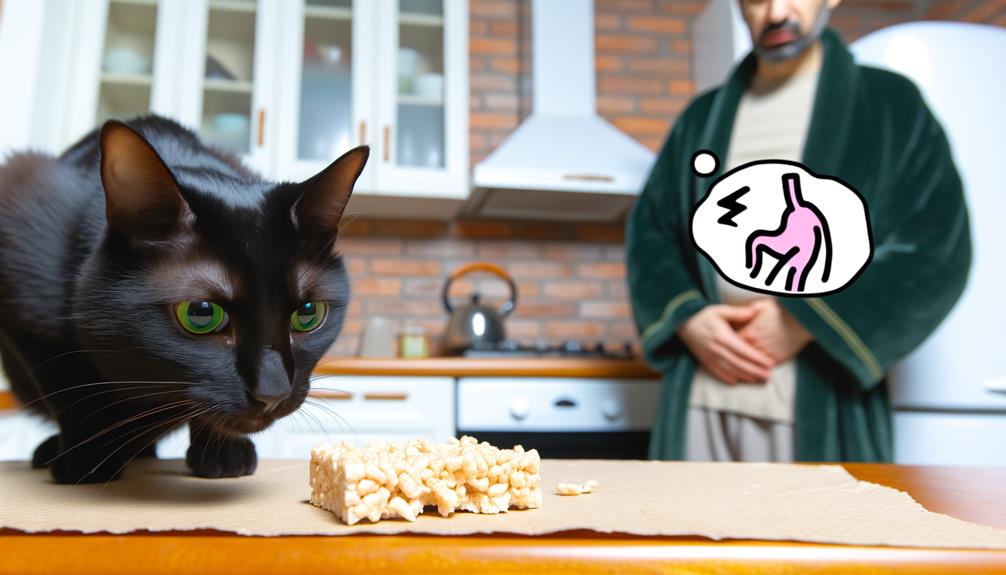
When a cat consumes Rice Krispies treats, minimal intervention is typically required due to the non-toxic nature of these snacks. However, it's important to monitor your feline friend for any signs of gastrointestinal upset, given the high sugar content of these treats. While Rice Krispies treats are not toxic to cats, casual consumption can still lead to some discomfort.
Cats generally show limited interest in Rice Krispies treats because they can't taste sweetness, making these snacks less appealing. However, if your curious cat does indulge, here's what you need to know:
- Monitor for Symptoms: Keep an eye out for signs of digestive issues like gas, vomiting, or diarrhea. These can occur if a cat consumes a large quantity of Rice Krispies treats.
- High Sugar Content: These treats are high in sugar, which cats don't process well. High sugar intake can cause gastrointestinal upset and lead to potential health problems.
- Limited Interest: Most cats won't go out of their way to eat Rice Krispies treats due to their inability to taste sweetness, reducing the likelihood of frequent consumption.
- Veterinarian Consultation: If your cat shows symptoms like vomiting or diarrhea, withhold food temporarily and consult a veterinarian to guarantee there are no underlying health issues.
In most cases, casual consumption of Rice Krispies treats doesn't lead to significant health problems. However, it's always wise to observe your cat for any adverse reactions and consult a veterinarian if symptoms persist. Maintaining vigilance can help safeguard your cat's wellbeing while preventing any potential health complications from these sugary snacks.
Long-term Implications
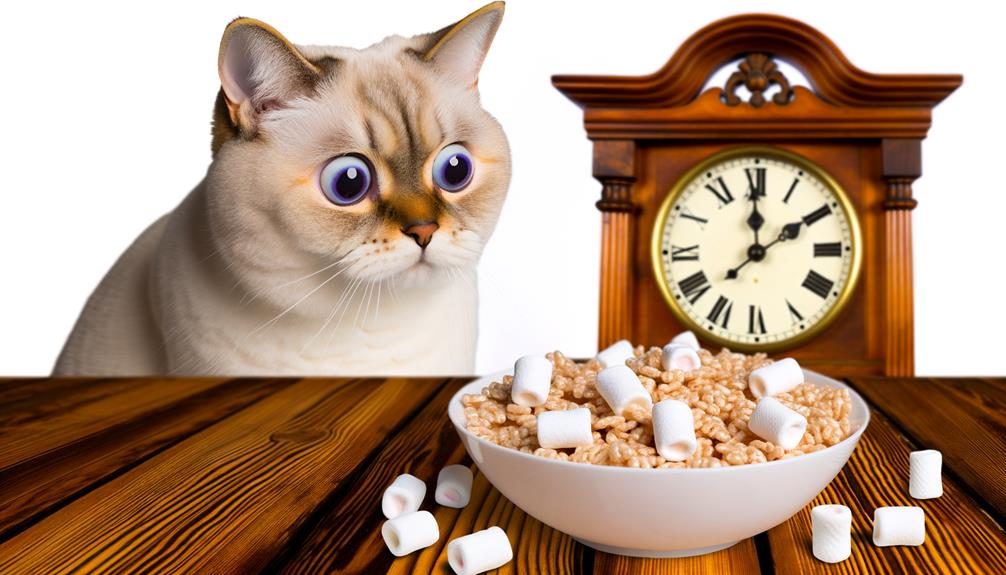
Feeding Rice Krispies treats to your cat over the long term can lead to several serious health issues due to their high sugar and carbohydrate content, which are fundamentally incompatible with a cat's obligate carnivore diet. Cats require a diet rich in animal protein, and the excess sugar and carbohydrates in Rice Krispies treats can disrupt their metabolic processes. Over time, this can result in obesity, notably increasing the risk of diabetes, heart disease, and joint problems due to the extra weight.
Furthermore, the nutritional composition of Rice Krispies treats is inadequate for cats. These treats lack essential nutrients necessary for feline health, such as taurine, fatty acids, and certain vitamins and minerals. Prolonged consumption can lead to malnutrition, affecting your cat's overall health and well-being. Symptoms of malnutrition can be subtle initially but may progress to more severe health issues, including compromised immune function and poor coat quality.
Cats consuming Rice Krispies treats regularly may also experience mild digestive symptoms like gas or diarrhea. These digestive symptoms can become more pronounced with continued feeding, potentially leading to chronic gastrointestinal issues. It's vital to monitor your cat for any adverse reactions after consuming such treats. If you notice signs of discomfort, consult a veterinarian promptly to address any potential health concerns.
Related Considerations
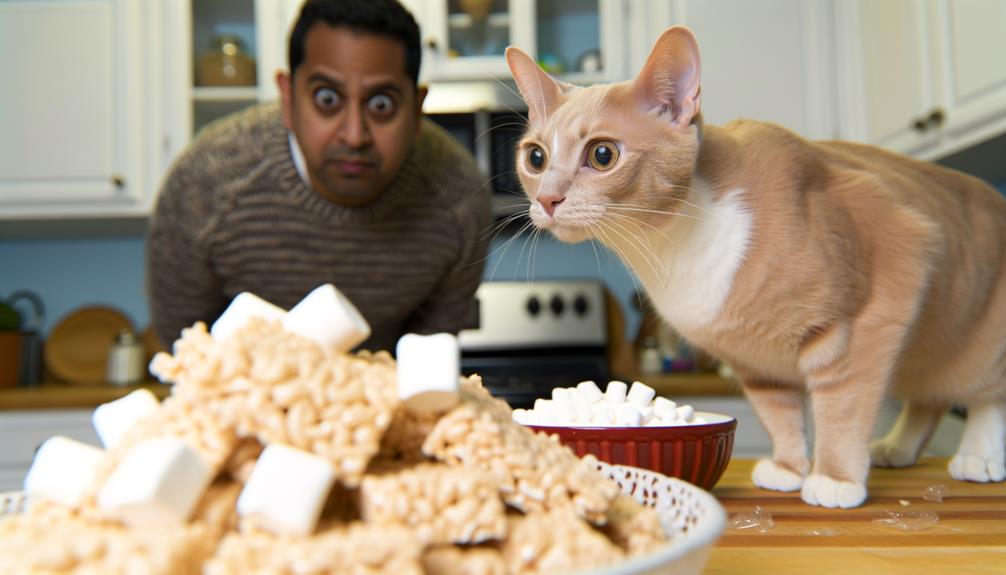
Given the serious long-term health implications of feeding Rice Krispies treats to your cat, it's important to contemplate related factors that could affect your pet's well-being. Cats are obligate carnivores, meaning their diet should primarily consist of meat. Introducing high-sugar, high-butter treats like Rice Krispies into their diet can lead to obesity and gastrointestinal upset, compromising their overall health.
Here are some essential considerations:
- Nutritional Needs: Cats have specific nutritional requirements that sugary human snacks can't meet. A diet lacking in essential nutrients can lead to severe health issues.
- Gastrointestinal Upset: Even small amounts of Rice Krispies treats can cause digestive problems. If your cat accidentally consumes these treats, monitor them for signs of gastrointestinal upset, such as vomiting or diarrhea.
- Obesity Risk: Regularly feeding your cat Rice Krispies treats can contribute to rapid weight gain, leading to obesity. Obesity in cats is linked to various health problems, including diabetes and joint issues.
- Human Food Alternatives: Instead of offering Rice Krispies, consider safe snacks that align with a cat's dietary needs. Options like small pieces of cooked chicken or commercial cat treats are much better choices.
Understanding these factors can help you make informed decisions about your cat's diet. While it might be tempting to share your snacks, remember that not all human foods are safe for feline consumption. Continuous education on feline nutritional needs guarantees your cat maintains a healthy and balanced diet, free from the risks associated with inappropriate treats. Always prioritize your cat's health and well-being by choosing safe, nutritionally appropriate foods.
Chocolate Toxicity in Cats
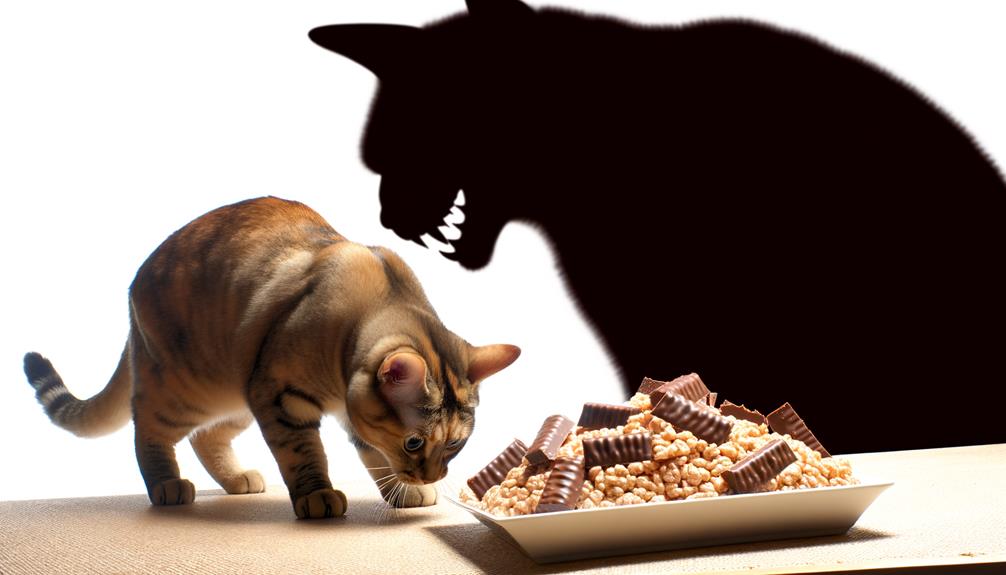
Have you ever wondered why chocolate is so dangerous for cats? The culprit is theobromine, a compound found in chocolate that cats can't metabolize effectively. When a cat ingests chocolate, the theobromine builds up in their system, leading to serious health issues.
Chocolate Toxicity in Cats: Key Points
| Factor | Impact on Cats |
|---|---|
| Type of Chocolate | Darker chocolates are more toxic |
| Amount Consumed | Even small amounts can be harmful |
| Cat's Weight | Smaller cats are at higher risk |
The symptoms of chocolate toxicity in cats can be quite alarming and include vomiting, diarrhea, and an increased heart rate. In severe cases, ingestion of chocolate can lead to seizures. It's vital to monitor your cat closely if you suspect they've eaten any chocolate-containing treats.
The severity of chocolate toxicity depends on several factors: the type of chocolate ingested, the amount, and the cat's weight. Dark chocolates, for example, are much more toxic than milk chocolates due to their higher theobromine content.
| Symptom | Explanation |
|---|---|
| Vomiting & Diarrhea | Early signs of toxicity |
| Increased Heart Rate | Indicates cardiovascular stress |
| Seizures | Severe neurological impact |
Immediate veterinary consultation is vital if you suspect your cat has ingested chocolate. Time is of the essence to minimize the health risks. Don't wait for symptoms to escalate; early intervention can make a considerable difference in your cat's recovery.
Monitoring and Care
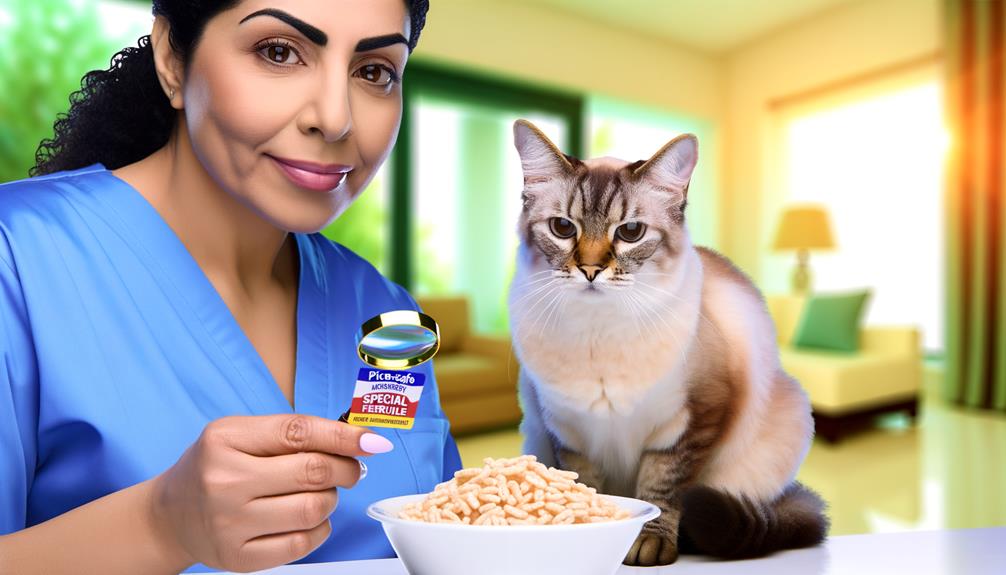
When your cat consumes something potentially harmful like Rice Krispies treats, immediate and vigilant monitoring is vital. Cats can be sensitive to the high sugar content in these treats, which may lead to gastrointestinal symptoms such as vomiting and diarrhea. Here's how you can guarantee your feline friend stays healthy:
- Monitor for Symptoms: Keep a close eye on your cat for any signs of gastrointestinal distress. This includes vomiting, diarrhea, and changes in appetite. High sugar intake can disrupt your cat's digestive system, leading to discomfort and potential health issues.
- Provide Fresh Water: Make certain your cat has access to fresh water at all times. This is particularly important if your cat experiences vomiting or diarrhea, as these symptoms can quickly lead to dehydration. Fresh water helps maintain hydration and supports overall health.
- Observe Behavior: Watch your cat's behavior closely for a few days after ingestion. Note any significant changes such as lethargy, reduced appetite, or unusual activity levels. These changes may indicate your cat is experiencing discomfort or other health problems.
- Consult a Veterinarian: If your cat shows persistent signs of distress, like ongoing vomiting or diarrhea, or if you notice any concerning behavioral changes, it's essential to consult a veterinarian. A professional can provide a thorough evaluation and necessary treatment to guarantee your cat's well-being.
Regular veterinary check-ups are also beneficial to monitor your cat's overall health and dietary needs. By being proactive and attentive, you can help prevent and address any health issues arising from accidental consumption of human foods like Rice Krispies treats.
